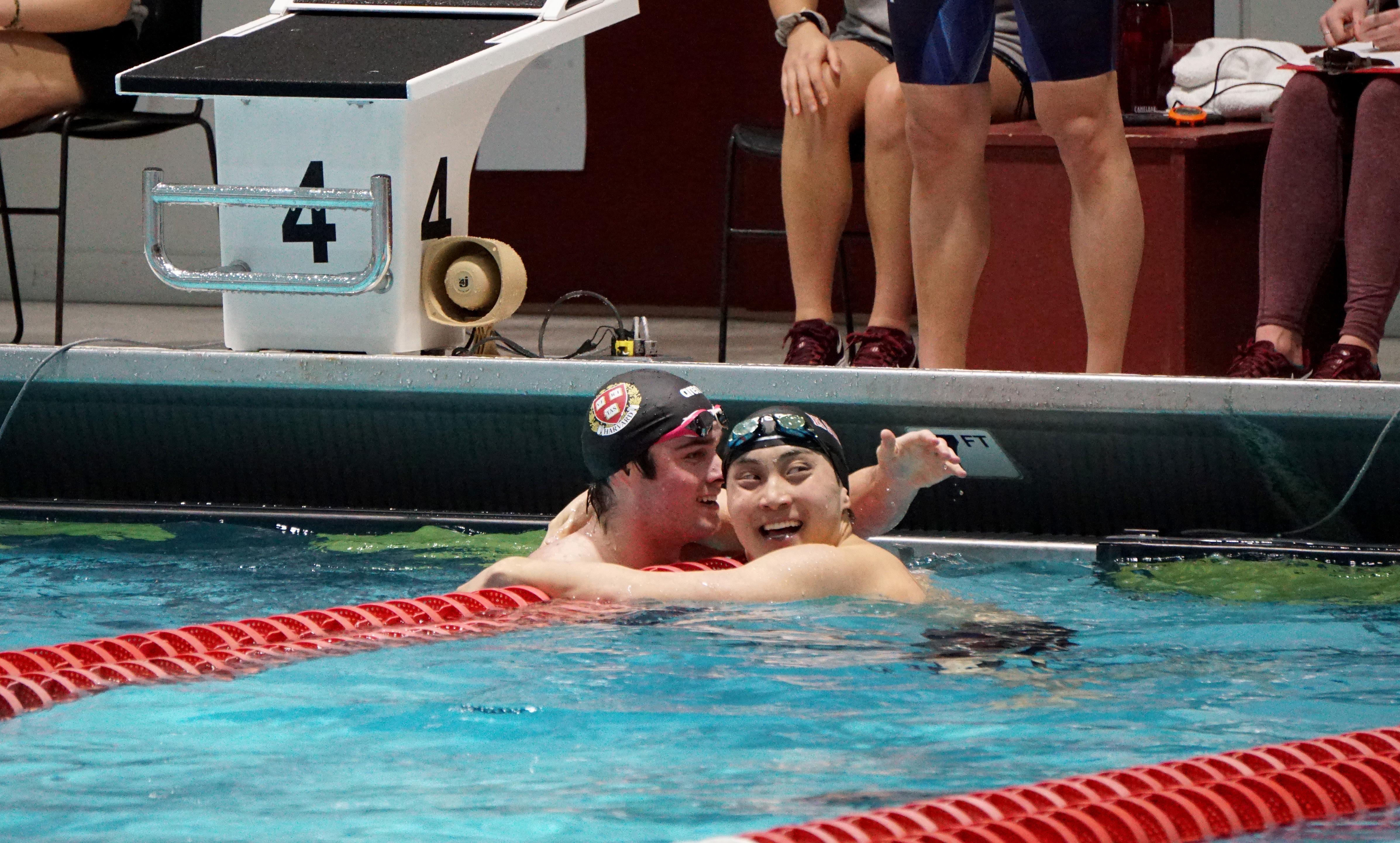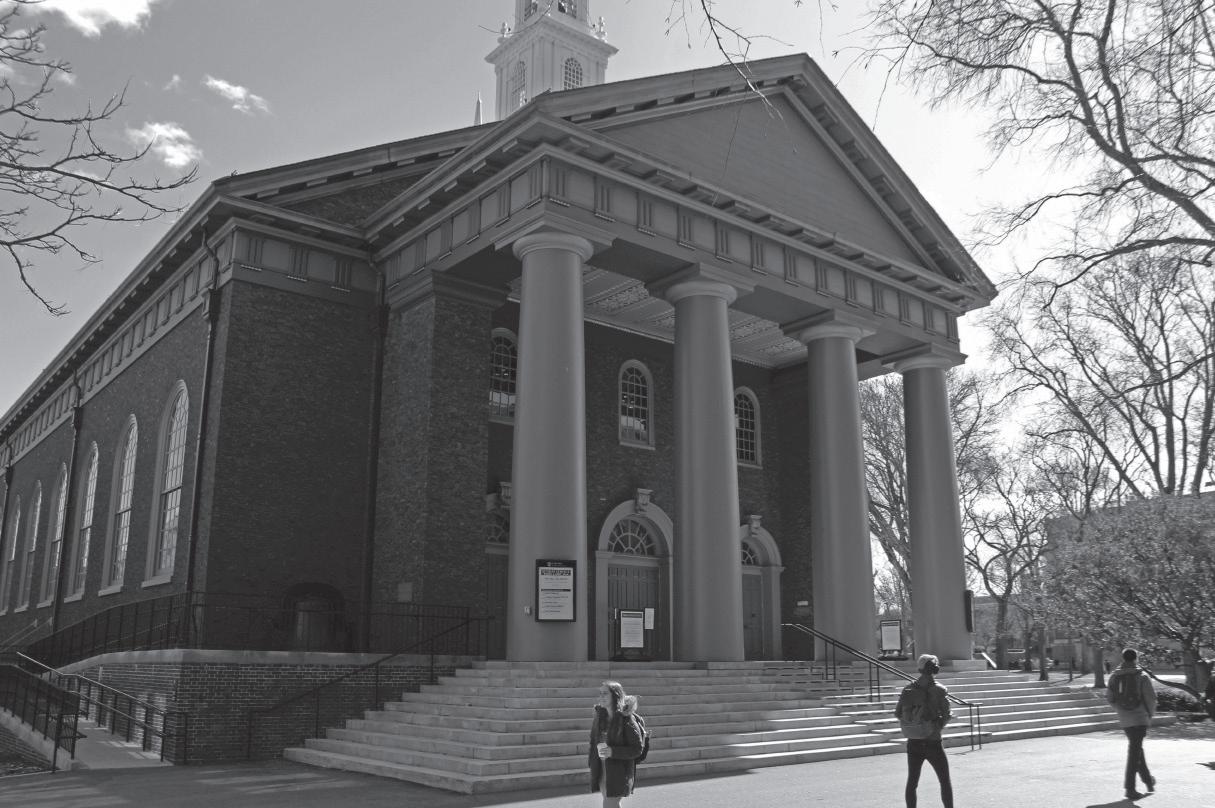
23 minute read
Sports
EDITORIAL
THE CRIMSON EDITORIAL BOARD
Riley Cannot Be Judge, Jury, and Defendant
The Harvard University Police Department will be undergoing a review of its internal climate with the help of national policing experts Ronald L. Davis and Brenda J. Bond-Fortier. The review, which will be spearheaded by HUPD Chief Francis D. “Bud” Riley and University Executive Vice President Katie N. Lapp, comes as a response to The Crimson’s report on HUPD’s culture of sexism, racism, and alleged favoritism spanning two decades.
The decision is by no means sufficient. It is also entirely unsurprising. Our institution has a long history of dodging responsibility behind obscure internal reviews and hiding behind administrative proceedings. From opposing third-party arbitration for sexual assault allegations to its controversial handling of the sexual misconduct claims against former Government Department Professor Jorge I. Dominguez, Harvard has repeatedly shown itself reluctant to accept fully external and transparent probes into its internal issues. That attitude, both during the Dominguez controversy and now, actively endangers its student body.
When the deeply troubling allegations against HUPD first emerged, we voiced our opinion unequivocally: “Riley Must Go.” As we detailed then, there is a strong moral case for demanding Riley’s resignation. He either tolerated or actively facilitated the growth of a racist and sexist culture within his department.
We also expressed the practical reasons for the necessity of his departure, given the possibility that students might grow reluctant to engage with a police department that fosters such a culture. We, like several student activist groups on campus, stand by that assessment, and by a completely unambiguous meaning of the word “must.”
Instead, Riley will be overseeing the review committee tasked with dealing with the very issues that several sources link directly to him.
The notion itself is, of course, borderline satirical. Riley has had 24 years to improve his department’s morale and deal with internal issues regarding discrimination and diversity. Doing as much is a core part of any leadership position. Instead, he presided over a period that saw as many anti-discrimination lawsuits directed against him personally as women promoted to leadership positions within the department.
He has been specifically named as the origin of the HUPD’s toxic culture by several sources, including allegations that he sought to create an “old boys’ network” where personal connections to him were excessively prized. Perhaps even more concerningly, three female employees filed affidavits detailing specific instances of sexist behavior allegedly perpetrated by Riley.
His actions speak for themselves. Yet according to the email announcement of the internal review he will be spearheading, Riley remains committed to improving department morale. Given his allegedly central role in a litany of climate issues within the department itself, it seems that goal would be best served by his departure.
Indeed, unless Riley can definitively show that recent reports do not offer an accurate picture of the department, his resignation is imperative.
A response by HUPD and the University rooted in bureaucratic secrecy rather than accountability and transparency is not the solution; an internal review is by no means enough. Riley must go.
This staff editorial solely represents the majority view of The Crimson Editorial Board. It is the product of discussions at regular Editorial Board meetings. In order to ensure the impartiality of our journalism, Crimson editors who choose to opine and vote at these meetings are not involved in the reporting of articles on similar topics.
Submit an Op-Ed Today!
The Crimson @thecrimson
OP-ED
A Case for Harvard’s Own: Elizabeth Warren
The 2020 Democratic candidate must have the temperament and platform that motivates every Democrat — not to mention their independent father — out to the polls. That candidate is Elizabeth Warren — and not just because she is an emerita professor at Harvard Law School.
Two overarching questions face Democrats right now. The first question asks, “Will Democrats win 2020 by appealing to the median voter, or will they win by mobilizing the Progressive flank?” And the second question asks, “Is Trump an aberration, or is he a symptom of the nation’s deeper ailments?”
I am not the first to raise these questions — just go over to CGIS and you’ll hear them debated ad nauseum. But as Super Tuesday approaches and many Harvardians gear up to vote in Massachusetts or mail ballots home, people outside the political punditry must fiercely interrogate these questions themselves. After all, how we answer them matters for how we answer the bigger question of who is best positioned to beat Donald Trump in November.
If Democrats believe that galvanizing the progressive vote will carry them to victory in 2020 and that Trump is symptomatic of deeper issues, then the logical conclusion is to nominate Bernie Sanders. Conversely, if Democrats believe that victory rests with the median voter and that Trump was an aberration, then the logical conclusion is to put forward Joe Biden, Michael Bloomberg, or Amy Klobuchar— who can appeal to middleof-the-road America.
The answers to these two questions, however, are not so black and white. Looking at 2016 voting, for instance, it is noteworthy that 12 percent of Sanders’s primary voters ultimately voted for Trump, which should be a cautionary tale about nominating a candidate with lackluster progressive credentials. Still another 12 percent of Republican primary voters (particularly supporters of John Kasich and Marco Rubio) cast their ballot for Hillary Clinton, indicating that By MICHAELG. MONTELLA
the median voter is not “dead” as many progressives decry. It would therefore be dangerous to put forward either a progressive who risks alienating the median voter or a moderate who can’t keep progressives in the fold.
Let’s instead nominate a candidate positioned to straddle the intraparty rift; who promises to usher in big, structural change while not going so far as to abandon America’s core systems; who dreams big and fights hard; who refuses to hold her punches. Let’s nominate Senator Elizabeth Warren.
When it comes to envisioning a more equitable America, Warren is unparalleled. Her dizzyingly comprehensive agenda, genuine sensitivity to issues of race, gender, and identity, and expansive interpretation of executive power qualify her as the best standard-bearer for the progressive cause, not Bernie.
Unlike Sanders, Warren has spent the past 40 years studying the factors exacerbating inequality and degrading American mobility. Unlike Sanders, Warren has the record of creating a highly effective federal agency, the Consumer Financial Protection Bureau, which has returned $12.4 billion back to American households cheated by financial companies. And unlike Sanders, Warren has actually fulfilled her Senatorial duty and legislated — the primary sponsor on nine Senate bills, compared to Sanders’s three, and since 2013, a co-sponsor on 50 laws, compared to Sanders’s 17 over the same period. Warren is therefore the more qualified representative of the progressive cause, eager to pick up the fragmented pieces of the executive branch and better people’s lives through the subtle yet seismic push-and-pull of regulatory levers.
Warren would also handily maintain moderate’s support.
First, Warren’s establishment support — proxied by endorsements — is surpassed only by Biden and Bloomberg, according to FiveThirtyEight’s analysis. And I would argue that merely analyzing Warren’s endorsements from the likes of Edward Markey (D-Mass.), Julian Castro, Joe Kennedy III (D-Mass.), and Ayanna Pressley (D-Mass.) actually under-estimate her cache. After all, she was also a professor at Harvard Law School, where she taught current members of Congress, including Katie Porter (D-Calif.), and Kennedy, both of whom formally endorsed her, and she maintains strong ties to the Obama administration from her days building the CFPB and cleaning up after the Global Financial Crisis.
Second, the mantelpieces for Warren’s campaign — anti-corruption, reviving the American Dream for all, education, and labor rights — are broadly popular among the American electorate, which will motivate Moderates to embrace her platform given their belief in victory through broad appeal. In turn, down-ballot Democrats will be able to ride Warren’s coattails with a laser-focus on not-so-sexy but oh-so-important policies.
Finally, Warren elevates reform over revolution, channeling the legal and political traditions of Louis Brandeis, Franklin D. Roosevelt, Class of 1904, and Lyndon B. Johnson to inform her plans for a more equitable and just America. These three figures are demigods in Democratic lore, and Warren gives Democrats the chance to revive some of that transformational glory.
Up until this point, the electability conversation has focused too much on individual candidates and too little on party unity. So, before we cast the last ballot, let’s be straight with ourselves: Neither moderates nor progressives will win without each other, and neither moderates nor progressives can govern alone. There is only one candidate positioned to unify the party. That candidate is Senator Elizabeth Warren.
Warren is ready to roll up the sleeves of her Nina McLemore blazer and fight like the dickens. Her persistence, her intellect, and her fierceness is Trump’s worst nightmare. And it is the Democrats’ best shot.
COLUMN
Tiny Worlds of Untapped Potential Daniel L. Leonard BRAVE NEW WORLDS
What’s the largest amount of money that you can think of?
The biggest U.S. lottery jackpot of all time was $1.586 billion. The total net worth of the world’s richest man, Jeff Bezos, is estimated to be $116 billion (at the time of publishing). And in 2018, the Gross Domestic Product of the entire world was $85.910 trillion. With those figures in mind, I ask again: what’s the most money that you can imagine?
There is an asteroid between Mars and Jupiter, named 511 Davida, which is estimated to be worth $15.4 quintillion. That’s 15,400,000,000,000,000,000 dollars — in other words, just enough money to afford popcorn at your next trip to the movies. In fact, Davida is one of a few dozen asteroids in our solar system that are valued at over a quintillion dollars; hundreds more are valued in the trillion- and quadrillion-dollar range. Given those numbers, it should come as no surprise that, since the start of the century, numerous companies have emerged seeking to bring asteroid mining from science fiction to reality.
There are two main ways to accomplish this feat. The first involves launching an unmanned spacecraft equipped with mining gear, which would collect a chunk of an asteroid and bring it back to Earth. The Japanese Aerospace Exploration Agency has proven that this is technically feasible; its Hayabusa mission brought asteroid dust samples back to Earth in 2010, while its Hayabusa 2 mission is expected to bring back larger samples later this year.
The second method is more ambitious. As the research shows, we could hypothetically build a spacecraft that could capture a small asteroid and place it in orbit around the Earth or the Moon. Once it’s that close, we could collect the mineral resources with relative ease; with the right asteroids, this could allow trillions of dollars worth of material to be brought to Earth.
If asteroid mining does take off as the next big industry — as some magazines have predicted — then this would certainly have its benefits; the most obvious is a potentially massive economic boost to us here on Earth. (Looking at the Dow, we could certainly use one right now.)
If asteroid mining were carried out by a government agency like NASA, the unbelievably high profits could be used to support a host of beneficial causes, from funding welfare programs to supporting scientific research. If, on the other hand, asteroid mining was performed by private companies, the monetary benefits would certainly not be as widespread. Even so, this money would be a big boost to the global economy — and governments could still profit off of it through high corporate taxes. Of course, introducing a massive amount of precious metals into the global economy would steeply devalue those materials, so the overall profits of asteroid mining will probably be far lower than they appear on paper.
But asteroid mining could also help lessen the destruction caused by current mining here on Earth. The Guardian reports that “Extraction and primary processing of metals and other minerals is responsible for 20% of health impacts from air pollution and 26% of global carbon emissions.” If we shift our attention from the Earth to the sky in order to satisfy our needs for certain minerals, we could avoid much of the environmental degradation caused by Earth-based mining today. Plus, if humans were to deplete Earth’s cheap mineral resources — which we are in the process of doing — mining asteroids may one day be viewed as a necessity.
That being said, advocates of asteroid mining must be mindful of the ideology underpinning their movement. I found myself fascinated by Asterank’s interactive table of asteroids. The chart lays out the distance of the solar system’s asteroids from the Sun, the eccentricity of their orbits, and their velocity — so far, all things you might expect to see in an astronomy textbook. But the central two columns stick out like sore thumbs: “Value ($)” and “Est. Profit ($).”
Viewing asteroids through the lens of “How profitable might they be?” can have dangerous implications. If we begin our exploration into space with a profit-oriented mindset, then the next few centuries of space travel will likely be dominated by that perspective; we’ll enter a period of space exploitation, not space exploration. And, if we don’t restrain that mindset, scientists warn that we could use up all the solar system’s essential resources in a matter of centuries. So, the prospect of asteroid mining offers a turning point for how humanity interacts with the natural universe. Will we allow ourselves to be ruled by greed, quickly gobbling up all the natural resources within reach of our spacecraft? Or will we use space travel as a tool to explore and appreciate our planet’s surroundings, taking only the resources that we truly need? The choice is ours — and it’s a choice that will affect humanity’s future for centuries.
SPORTS
MEN’S BASKETBALL VS. BU W, 18-17 ___________________________________________________________ WOMEN’S HEAVYWEIGHT CREW VS. YALE L ___________________________________________________________ FOOTBALL VS. UNIVERSITY OF VERMONT L, 42, 36 ___________________________________________________________ FENCING NEW ENGLAND CHAMPIONSHIP 15TH ___________________________________________________________ WOMEN’S SWIMMING IVY LEAGUE CHAMPIONSHP 2ND ___________________________________________________________ GOLF VS. PRINCETON W ___________________________________________________________ MEN’S WRESTLING VS. PENN STATE L, 42, 36 ___________________________________________________________ THIS WEEKEND’S SCORES WOMEN’S BASKETBALL ABOUT THE TEAM 2019-2020 Overall Record 14-11 ______________________________________ Conference Record 5-7 ______________________________________ Games 25 ______________________________________ PTS Per Game 58.8 ______________________________________ FG % 36.9 ______________________________________ 2018-19 Overall Record 17-13 ______________________________________ Conference Record 9-5 ______________________________________ Games 30 ______________________________________ PTS Per Game 70.8 ______________________________________ FG % 40.8 ______________________________________ UPCOMING GAMES ______________________________________ Women’s Basketball vs. Brown 6:00pm at Brown Women’s Basketball vs.Yale 4:00pm at Yale
WOMEN’S BASKETBALL Harvard Falls Short Against Cornell on Senior Night
By EMA R. SCHUMER CRIMSON STAFF WRITER
In its final home game of the season, Harvard suffered an upset 55-47 defeat to Cornell after losing a decisive game less than twenty four hours earlier.
As the game clock wound down, tears fell from the face of senior forward Jeannie Boehm, who finished with 12 rebounds and seven blocks before fouling out in what will most likely be her last game ever on the hardwood of Lavietes Pavilion.
Sitting on the bench with a towel draped over her face, Boehm shared an emotional moment with Coach Kathy Delaney-Smith, who embraced her longtime player.
Also on the bench sat senior co-captain Mackenzie Barta, who sustained an injury in a game against Princeton at the start of the month that forced her collegiate career to an early finish.
Saturday’s loss was rife with significance not only for the two seniors but for the entire Harvard squad.
The defeat extends the Crimson’s losing streak to five games and all but surely excludes Harvard (14-11, 5-7 Ivy) from a berth in the Ivy League Tournament — the first time the Crimson will not qualify since the tournament began three years ago. This season’s results signify a blip in Delaney-Smith’s illustrious Ivy League coaching career.
On Saturday night, she tried coming to terms with the results of the game and of the season more broadly.
“Not meant to be,” she said. Still, Delaney-Smith said her players — many of whom assumed major roles on the team this season for the first time — should be proud of their accomplishments.
Highlights of Harvard’s play this season include mounting a comeback against University of California, defeating Ivy League powerhouse Penn, and snapping Yale’s undefeated record.
“This whole season I think we overachieved,” she said. “We had no right doing what we did.” Given these previous suc
BITTERSWEET FINALE The Crimson women’s basketball team fought until the last minute of the game but could not make up its deficit from a difficult first half. OWEN A. BERGER—CRIMSON PHOTOGRAPHER
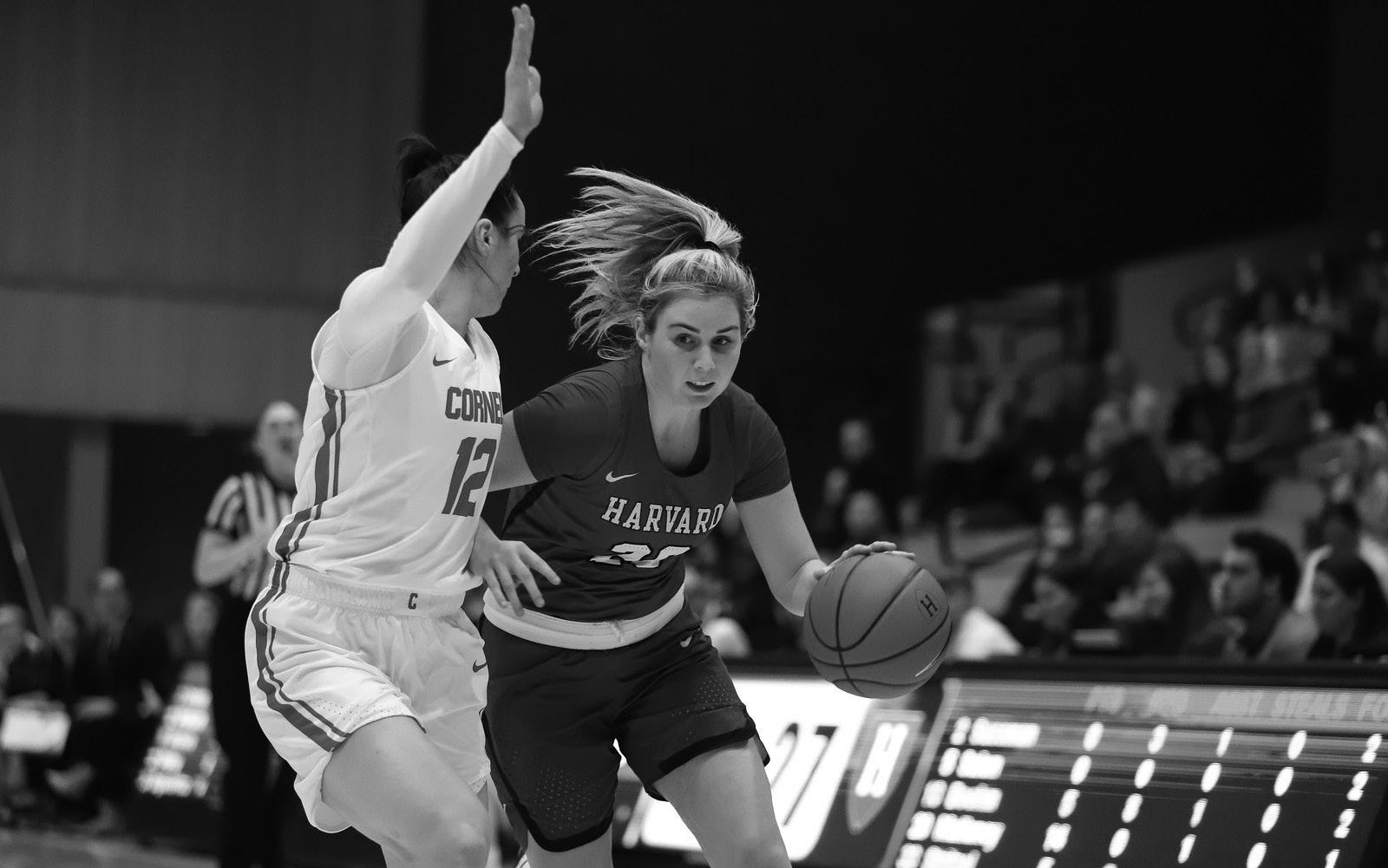
cesses, Harvard’s loss on Saturday night was partially unexpected.
Entering the game, the Big Red (10-14, 3-9 Ivy) had only eked out two conference wins all season.
The Crimson also had history on its side, having bested Cornell by 15 points only two weeks ago.
Harvard has not won a game since that contest.
The Crimson stepped onto the court Saturday evening still reeling from its devastating loss to Columbia just a day ago.
That loss put into serious doubt Harvard’s prospects of competing in the Ivy League Tournament and made Saturday’s game all the more crucial. From the start, the Big Red ran the Crimson off the court. Cornell attacked Harvard players on offense, repeatedly scoring uncontested breakaway layups.
On defense, the Big Red came out in a full court press that forced the Crimson to rush. Though Harvard players had a bevy of opportunities to score, they could not convert on most of those plays. The Crimson amassed a 19-point deficit in the first ten minutes alone.
Though Harvard’s loss symbolized the looming conclusion to its season, aspects of the Crimson’s Saturday performance also foreshadow a successful future for the young team.
Freshman guards Annie Stritzel and Lola Mullaney led Harvard’s effort, scoring 18 points and 17 points, respectively. Stritzel invigorated Harvard’s offense and evinced versatility by knocking down three triples and repeatedly navigating through traffic to finish in the lane.
Delaney-Smith said she was impressed by Stritzel’s performance.
“It was phenomenal. I thought it was gritty and tough,” she said. “And, you know, ‘nobody can stop me’ kind of mentality.”
Mullaney complemented Stritzel’s play, notching five three pointers in the game herself despite a slow start.
With two minutes remaining, Harvard trailed by 10 points. Still, Boehm gathered her teammates into a huddle. Though by that point the Crimson’s forthcoming defeat seemed inevitable, in this moment — as in many others — the team came together.
Stritzel said the team’s culture fosters unity.
“I’ve never met more girls who will put everything on the line and sacrifice everything for each other,” she said. “I think this team, it’s just part of our culture. That’s just who we are.” “And I feel that every time we step on the court together. We win together, we lose together.”
With just over a minute to play, Harvard, still trailing by 10 points, presented a full court press. Stritzel intercepted a desperate Cornell pass, grabbed a long offensive rebound off of a teammate’s missed shot, and shot and sunk a triple. Cornell coughed up the ball on the ensuing play and Stritzel wasted little time.
She quickly knocked down another three — this time from NBA range — bringing the game within four points and sending the Harvard crowd to its feet.
ema.schumer@thecrimson.com
MEN’S BASKETBALL Harvard Defeats Cornell to Clinch Ivy Tournament Berth
By HENRY ZHU CRIMSON STAFF WRITER
For any recordkeepers, Harvard’s Saturday night victory over Cornell was a good night. The Crimson earned its 20th win of the season, its most since the team last made the NCAA Tournament in 2014-2015.
Coach Tommy Amaker also notched his 250th career win at Harvard. Wih the victory, Harvard formally clinched one of four spots in the Ivy League Tournament. But despite the important result, the 67-58 victory was hardly one in which the Crimson’s all-time winningest head coach will likely remember by the time the team disembarks from its 5-hour bus ride back to Cambridge. “Not pleased with our overall performance and how we played, but certainly winning on a Saturday night in our conference, on the road, is something to be proud of,” Amaker said. “But I’m certainly not proud of our 19 turnovers, we
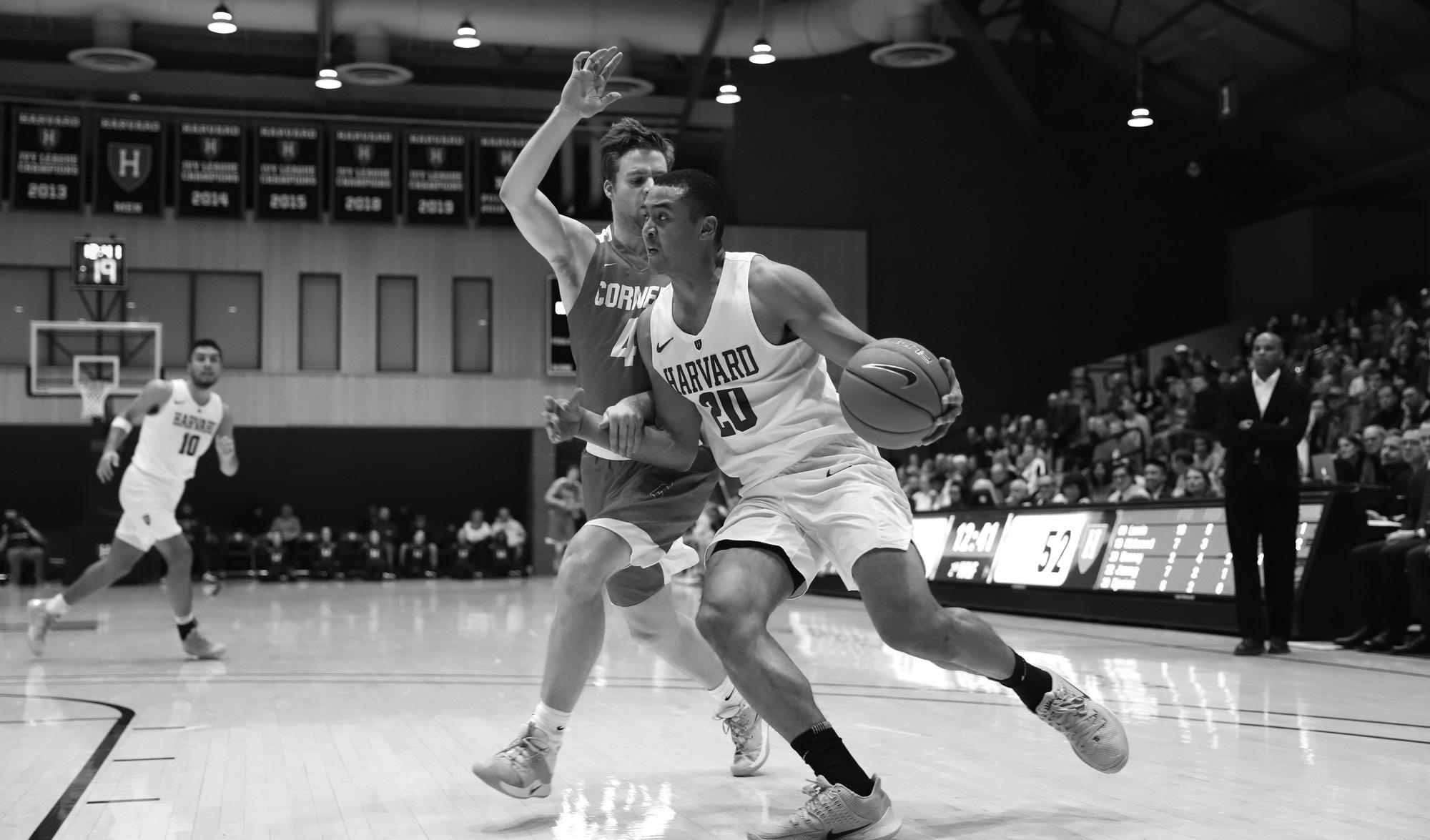
just looked disjointed.”
The two sides were toe-totoe for much of the first half, as a Harvard side possessing much stronger talent struggled to break free to a more comfortable margin.
Timely triples from Big Red guards Bryan Knapp and Dean Noll kept the Crimson lead to just one at the 5:26 mark of the first frame.
Without star forward Jimmy Boeheim for the second straight week, Cornell relied on its guard play for the bulk of its scoring in the contest.
But a timely 8-2 run to end the half — compounded by a string of four triples from Harvard’s Rio Haskett, Noah Kirkwood, and Danilo Djuricic to kick off the latter frame — seemingly brought the Crimson back to its contest at home against the Big Red, in which it cruised to an 85-63 win.
The Crimson widened its margin to 20 with 13:44 left to play, benefiting from the slashing of first-year Chris Ledlum. The Big Red, sensing a need to disrupt Harvard’s flow, subsequently bulked up its fullcourt press and zone defense. Without senior floor leader Christian Juzang, who suffered what appeared to be a right foot injury the night prior against Columbia, Harvard struggled to maintain its composure in the latter part of the second frame. Committing a total of 11 turnovers in the final 13:20 of the contest, the Crimson saw its lead dwindle to single-digits by the six-minute turn and failed to score a field goal in the last 11:33 of play.
Saving Harvard from further trouble was its accurate free-throw shooting.
Hitting 19-of-25 in the second half including 16-of-20 in its dry spell, the Crimson kept Cornell separated by at least seven points to conclude the contest. “We can’t put all of that on not having Juzang,” Amaker said. “But a lot to learn, and a lot to get better from, but I am proud of our guys winning on Saturday night.”
Junior guard Rio Haskett knocked down three triples in the contest and finished in double-digits at 11 points for the second straight game, while senior Robert Baker contributed a dozen to lead the visiting side. Harvard sits tied in second-place and a game back from Yale in the Ancient Eight table after the Bulldog’s perfect 2-0 weekend over Penn and Princeton.
If both teams can take care of business on Saturday against Brown and Dartmouth, respectively, the Crimson will have a chance to earn a share of the title against the Bulldogs on Saturday night.
SPORTS
WEEKLY RECAP SCORES WOMEN’S ICE HOCKEY VS. YALE W, 4-3 ___________________________________________________________ BASEBALL VS. ALABAMA L, 6-3 ___________________________________________________________ SOFTBALL VS. N.C. CENTRAL W, 19-0 ___________________________________________________________ MEN’S ICE HOCKEY VS. UNION W, 4-1 ___________________________________________________________ MEN’S VOLLEYBALL VS. PRINCETON L, 3-0 ___________________________________________________________ WOMEN’S LACROSSE VS. CORNELL L, 9-8 ___________________________________________________________ MEN’S LACROSSE VS. ALBANY L, 15-14 ___________________________________________________________
MEN’S SWIMMING AND DIVING Harvard Wins Ivy Championship, Secures Four-Peat
By ZING GEE CRIMSON STAFF WRITER
With this weekend’s Ivy League Championship, the men’s swimming and diving team has claimed the title for the fourth consecutive year, a streak it hadn’t matched since the 1998- 2001 seasons. The Crimson entered the meet tied for twenty-third in the national rankings — highest among its Ivy League competitors — and came out on top with 1,439 points over Princeton’s 1,231.
Prior to the meet, Senior co-captain Daniel Chang said “Our team has shown so much heart this season. In the end, our success is not dependent on single individuals, but the collective efforts of the entire team. We’re excited to see how everyone brings their best next week.”
After the meet, junior co-captain Michael Zarian summed up Harvard’s exceptional all-around performance while echoing Chang’s words. “We won the meet because nearly everyone out-swam what was expected of them,” Darian said. “Unlike a dual meet, the conference meet is won by getting more swimmers into A and B finals than other teams. Having everyone step up and sneak into the final heats provided us with a lot of depth to score more.”
Day one opened with the 200-yard medley relay of first-year Will Grant, sophomore Jared Simpson, sophomore Umitican Gures, and junior Mahlon Reihman finishing second in 1:16.34. Afterwards, the 800-yard freestyle relay of Reihman, junior Corban Rawls, Zarian, and first-year Marcus Holmquist secured first in an NCAA B-cut time of 6:20.96. Day two of the event began with first-year Cole Kuster beating out Dartmouth’s Connor LaMastrain in the 500-yard freestyle by 0.49 seconds to win the individual champion honors, with a season-best 4:18.17. Kuster’s exceptional swimming continued through days three and four, when he won his second individual champion honors in the 1,000-yard freestyle. Kuster bested Princeton’s Dylan Porges by 0.44 seconds with a time of 8:57.24, providing a key points boost as the Crim
ON A NEW WAVE Crimson swimmers get in the ready position for a race in this past weekend’s Ivy League Championship Meet. With top performances across the board, Harvard came out with a victory for their fourth consecutive Ivy League Championship. ZING GEE—CRIMSON PHOTOGRAPHER
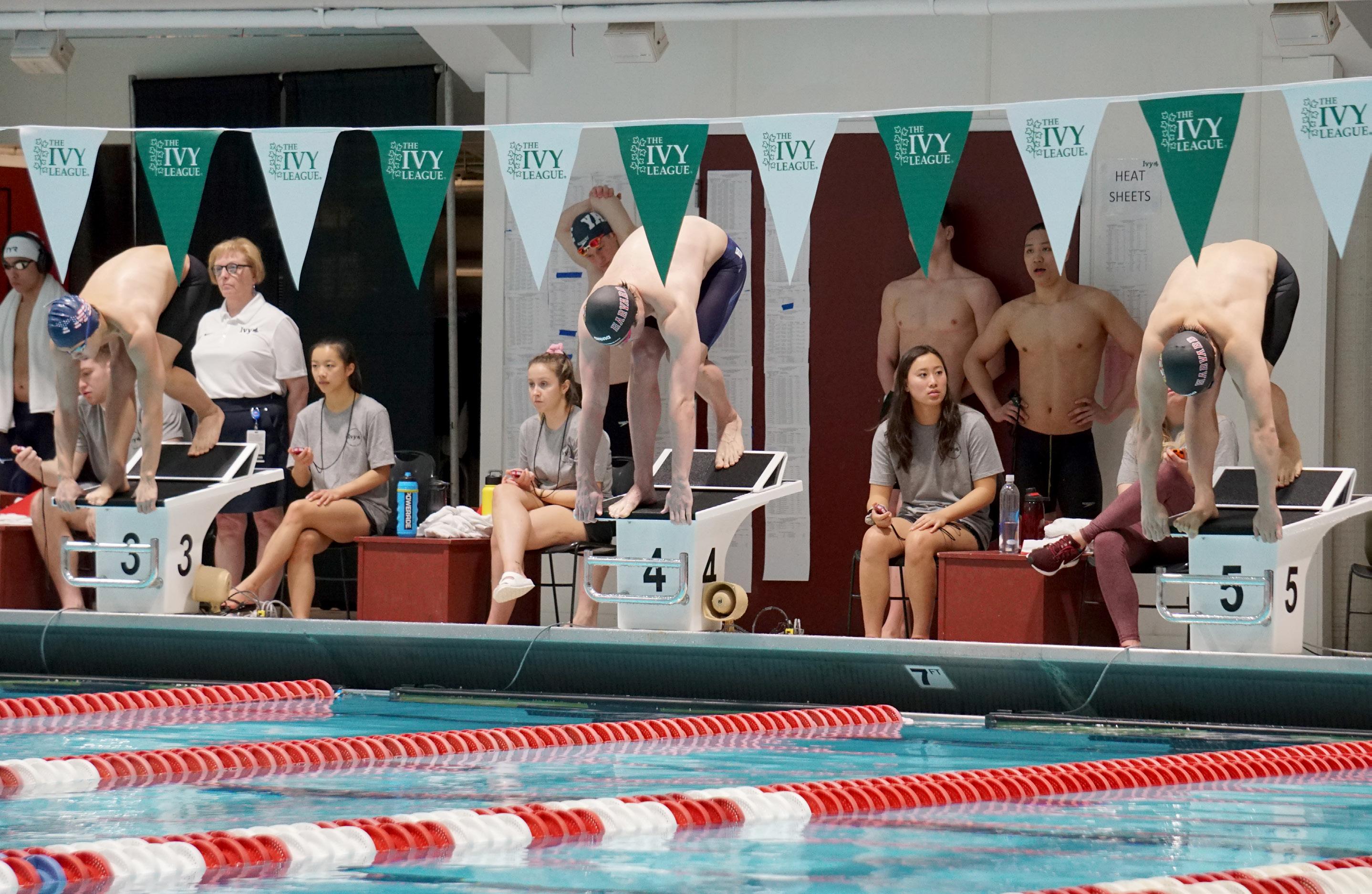
son and Tigers had gone back and forth throughout the earlier events of night three. On the fourth and final night, Kuster placed second in the 1,650-yard freestyle with a 15:10.30 to close out his stellar performance in the event.
Also on night two, Zarian took third in the 200-yard IM in 1:44.51, and Gures placed second in the 50-yard freestyle, 0.17 seconds shy of first.
“We just got better and better as the weekend went on,” said senior co-captain Daniel Chang. “Every fast performance “fired up the entire team moving onto the next race … we built on the momentum and it showed in the final team scores.” After the meet, Chang was named the Harold Ulen Career High Point Swimmer, having tallied 289 points over his four-year career.
Day three saw the Crimson well-represented in the 200- yard freestyle championship finals, as Rawls won the individual champion honors in 1:34.75, edging out second place by 0.23 seconds. Rawls was followed by Holmquist and Reihman in fourth with a 1:35.64 and fifth with a 1:35.94 (NCAA B-cut times), respectively. Sophomore Jacob Johnson finished fourth in the 100-yard butterfly, in an NCAA B-cut time of 46.58, while Zarian earned another trip to the podium, finishing second in the 400-yard IM with a 3:46.77. The 400-yard medley relay of Grant, junior Charles Vaughan, Gures, and Rawls placed second in 3:09:09 behind Columbia. Gures continued to rack up points, as he set a new Blodgett Pool and program record en route to winning the 100-yard butterfly with a 45.27. On the diving side, junior Alec DeCaprio and senior Austin Fields dove in 1-meter dive finals, placing fifth and sixth, respectively.
Fields and DeCaprio continued to represent Harvard well in the 3-meter dive consolation finals, finishing second and fourth with 328.20 and 313.95 points, respectively. First-year Luke Foster finished eighth with a 305.85. On the final day of competition, the Crimson once again performed well in the championship finals — this time in the 200-yard backstroke — as Grant won individual champion honors with an NCAA B-cut time of 1:41.49, followed by Zarian and Simpson in fourth and eighth, respectively. Sophomore Jake Johnson placed second in the 200-yard butterfly with an NCAA B-cut time of 1:43.07, and the 400-yard freestyle relay of Reihman, Rawls, Holmquist, and junior Levente Bathory closed the meet with a third-place 2:54.44.
After that, Harvard cheered as coaches jumped off the diving boards into the pool, celebrating their fourth consecutive Ivy League Championship title. Harvard swimmer Dean Farris, who holds the NCAA and American record in the 200-yard freestyle (1:29.15) did not compete this season as he trains for the Olympics. Competing without Farris at this year’s Ivy Championship revealed the true depth and talent of this year’s Crimson squad and the promising future ahead. Several Crimson swimmers will continue to swim at the NCAA Championships on March 25-28 in Indianapolis, Indiana, while several divers will be competing at the NCAA Zone A Championships on March 9-11 in Morgantown
zing.gee@thecrimson.com
